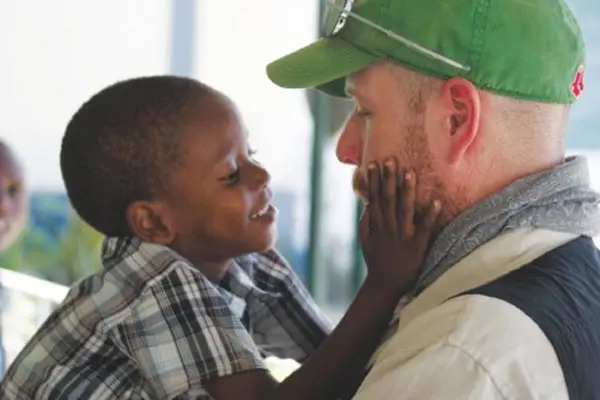 Image by Courtesy photo
Image by Courtesy photo
02/19/2016
Lowell Sun
By Alana Melanson
LOWELL -- It only took one visit to Haiti in 2005 for Bob Bancroft to know he would return.
Since then, Bancroft, an EMT and instruction coordinator for Trinity EMS, has been drawn back to the disaster-ravaged country once or twice each year on humanitarian and medical missions.
For the past four years, the Littleton resident knew he wanted to handpick his own team of local medical professionals to join him on one of these trips. That dream became a reality in January, when he was joined by 17 local EMTs, nurses, physicians assistants and others.
For nine days starting Jan. 26, the group traveled to Port-au-Prince and surrounding villages to provide basic medical care in places that had never seen it before.
Many were not prepared for the sensory overload they experienced upon their arrival: the odors, the stray animals, the lack of infrastructure. Six years after the catastrophic January 2010 earthquake, the overwhelming sense of disaster remains.
But as they drove up to the home of Bancroft's guide and friend, Franceli Joseph, they were greeted by the smiling faces of the children at Joseph's orphanage and others from the neighborhood.
"I think slowly it started to peel back the layers of disaster into beauty, and you can start to see some of the resiliency of the people of Haiti and the love and affection that they truly had for us," said John Casey, emergency management and EMS coordinator at UMass Lowell and a paramedic.
At primitive clinics, the volunteers treated nearly 650 grateful Haitians for ailments ranging from skin infections to hypertension.
Many of their patients were children. There were several malnourished babies, some who likely would have died if not for the intervention.
On the first clinical day, Bancroft's daughter, Bethany Bickmore, a registered nurse at Lawrence General Hospital, treated a 4-year-old girl with a knee abscess. In the U.S., the Westford resident said she would have to turn the patient over to a doctor. In Haiti, Bickmore was the girl's only hope. She set her nerves aside and likely saved the girl's leg.
Some patients had medical problems requiring care beyond the volunteers' abilities, but they were still able to make a difference. Bancroft said they donated $800 for double cataract surgery that will give an 8-year-old boy his sight and ability to go back to school. They donated $400 for hernia surgery for a farmer who has been unable to work to provide for his six children. They pooled their money to pay for hospital stays for sick babies and to provide vocational training to a young man mentored by Joseph.
Beth Eaton, a Lowell General Hospital paramedic and UML nutrition-science student, used the experience as the basis for her senior research project. The measurements she and other volunteers took of children to analyze malnutrition and stunted growth show at least 50 percent are malnourished.
Those studying such data are often removed from the people those numbers represent. But Eaton vividly remembers the children she saw, down to the colorful details of their clothing and shoes.
"It was like seeing something in color when you've only known it in black and white before," she said.
Before they left Haiti, they gave granola bars, candy and other snacks they brought to one of their translators.
They expected him to keep it for his family, but he shared the bounty with the neighborhood.
"He told us, 'If I'm hungry, everybody's hungry,'" said Deborah White, clinical nurse educator in the LGH emergency department.
The volunteers say the experience has changed them in ways they are only beginning to comprehend. They question how they can live with material comforts and resources far beyond what they need to survive. All feel drawn back to the simple life of Haiti.
Bancroft's son, Josiah, also a Trinity EMT, said he looks at his fridge full of food and feels he doesn't deserve it. He wonders how many Haitian children it could feed.
Trinity EMT Amanda Newby said she found she didn't want to come back to her belongings.
She said she realizes now she has so many things she doesn't need after being around people who have so little.
"Everyone says they have nothing, but sometimes I think they have everything," said Christina Carbone, of Chelmsford, a registered nurse at UMass Memorial Medical Center in Worcester. "We have such a disconnected society here, where everything is based on money and technology and status. These people have love and relationships and affection for each other, and they're happy for what they have."
Bancroft is now forming his own charitable nonprofit organization, Lavi, to continue missions to Haiti and allow more local residents and college students to participate. The name comes from the Haitian Creole word for life, and it's one that means a great deal to Bancroft.
Eight years ago, he encountered a woman who sought help for her gravely sick baby. In Haitian tradition, she had not named the child because she did not expect her to survive. The baby was lethargic and covered in head-to-toe skin infections.
Bancroft's team kept mom and baby nearby, providing several days of treatment. By the third day, the baby was alert, smiling and able to eat.
Overcome with joy at her child's chance at life, the mother asked Bancroft's team to name her baby, he said, his voice waivering. They agreed Lavi was the right fit.
"My mentor once told me, 'You help Haiti one Haitian at a time,'" Bancroft said. "That is our mission."
